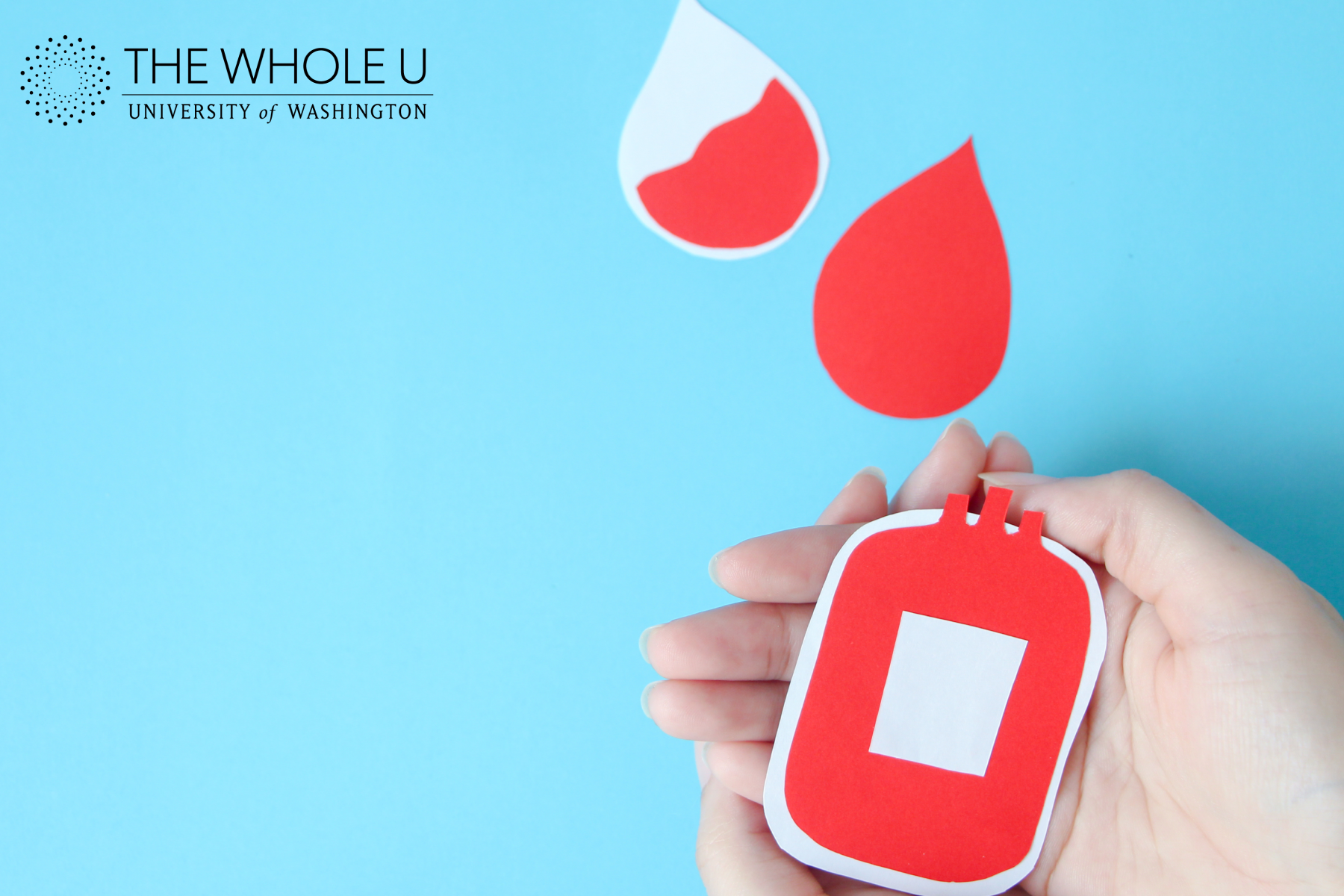
Blood donations urgently needed this National Blood Donor Month
Facing a severe blood shortage, Bloodworks Northwest is issuing a “Code Red” emergency in Western Washington and Oregon. Consider donating life-saving blood with Bloodworks NW at one of their pop-up locations at the UW Tower or Paccar Hall.
Blood donations, including platelets and plasma, save lives and improve the health of millions of people worldwide. However, maintaining an appropriate blood supply is proving a challenge this winter due to winter weather, the holiday season, and the “tridemic” of COVID-19, influenza and RSV.
Bloodworks Northwest is asking everyone who is eligible and feeling healthy to fill immediate appointments to give blood. A Code Red is declared after four consecutive days of emergency levels.
The American Red Cross, which provides about 40% of our nation’s blood and blood components, is also in urgent need of blood donations. The Red Cross has donor locations throughout the region.
Most people in good health, at least 18 years old, and who weigh at least 110 pounds can donate whole blood every 56 days. Right now, universal Type O blood is extremely important, especially for trauma and emergency situations when the patient’s blood type is unknown.
Understanding the need
According to America’s Blood Centers, while a majority of the U.S. population is eligible to donate blood, only about 3% do so – which is why spreading awareness is so essential. Indeed, the demand far exceeds the needs of those facing an unexpected emergency – some 1 in 7 people entering a hospital depend on a ready blood supply.
Cancer patients use a quarter of all blood donations while blood transfusions are needed in one out of every 83 newborn deliveries in America today, a rate that has increased by more than 50 percent between 2006 and 2015.

UWCFD staff donate blood at a Bloodworks popup in the UW Tower
Complicating the issue is the fact that less than 20% of all blood donations each year come from individuals in communities of color; donations from individuals 19 and under have dropped nearly by half over the last two years. This reality has created an urgent need for younger, more diverse donors.
President Richard Nixon proclaimed January 1970 as the first National Blood Donor Month on December 31, 1969, as requested by Senate Joint Resolution 154, to pay tribute to voluntary blood donors, encourage new donors to join and recognize the approximately three percent of the U.S. population that donates blood each year.
Blood facts
- Someone needs blood every two seconds in the U.S., and more than 4.5 million Americans would die every year without lifesaving blood transfusions.
- 25% of the nation’s blood supply is used by patients battling cancer.
- The American Red Cross needs 13,000 blood donations every single day to maintain an appropriate blood supply.
- 1 in 3 Black blood donors are a match for a patient with sickle cell disease.
- The American Journal of Epidemiology reports that blood donors are 88 percent less likely to have a heart attack.
- People who begin donating blood at age 17 and donate every eight weeks will have donated 48 gallons of blood by age 76.
- Your dog can donate blood, too. Check with your veterinarian and the Humane Society to make sure you know the local rules and regulations for this type of donation.
You may still donate blood, platelets or plasma after receiving a COVID-19 vaccine. Knowing the name of the manufacturer (Pfizer, Moderna, J&J, etc.) of the vaccine is important in determining your blood donation eligibility. To learn more about the COVID-19 vaccine and blood donation, click here. Donors can donate blood ten days after COVID symptoms resolve, and COVID and flu vaccinations do not affect your ability to donate blood.
How you can help: Donate blood, money, or time
These nonprofit organizations are UWCFD members to whom you can donate directly through payroll deduction. Consider a one-time or monthly gift in addition to your blood donation:
The American Red Cross (charity code 0337346): a humanitarian organization led by volunteers, provides relief to victims of disaster and helps people prevent, prepare for, and respond to emergencies. The Red Cross provides about 40% of our nation’s blood and blood components, all from generous volunteer donors.
Schedule a donation appointment with The American Red Cross
Bloodworks Northwest (charity code 0316056): is an independent, community-based, nonprofit organization providing blood services to over 90 hospitals and conducting groundbreaking research in blood storage, transfusion, and hemophilia care.
Bloodworks is hosting multiple popup donation drives at the UW Tower and Paccar Hall this winter.
Blood Center Foundation of the Inland Northwest (charity code 1481726): raises funds and invests in health care education, technology and research grants in support of your regional community and Inland Northwest Blood Center.
Cascade Regional Blood Services (charity code 1481206): is the link between volunteer blood donors and life-saving blood transfusions.